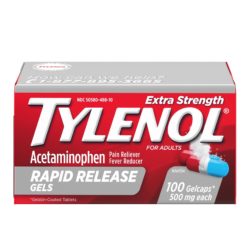Top Class Actions’s website and social media posts use affiliate links. If you make a purchase using such links, we may receive a commission, but it will not result in any additional charges to you. Please review our Affiliate Link Disclosure for more information.
Update:
- Johnson & Johnson asked a New Jersey federal judge to dismiss a class action lawsuit alleging Tylenol Rapid Release Gels do not work as advertised.
- The motion to dismiss was filed Sept. 23 in a New Jersey federal court, arguing that the plaintiffs lack standing for injunctive relief as they are already aware of the alleged deceptive business practices.
- Lead plaintiff Edward Hernandez claimed that he and other consumers were duped by Johnson & Johnson’s Tylenol Rapid Release as the product actually works more slowly than regular versions of the painkiller.
- “Because plaintiffs are now well aware that Tylenol Rapid Release Gelcaps do not work faster at relieving pain than Tylenol tablets, they could not possibly ‘be deceived again into buying the Gelcaps ‘without being aware’ of this basis for their own theory of allegedly deceptive marketing,” Johnson & Johnson says.
(May 22, 2020)
A federal judge ruled that a class action lawsuit alleging Tylenol Rapid Release Gels do not work as advertised will, for the most part, move forward.
Lead plaintiff Edward Hernandez claimed that he and other consumers were duped by Johnson & Johnson’s Tylenol Rapid Release time.
According to the complaint, the drug maker advertised the Rapid Release Gels as “fast working,” but the product worked more slowly than regular versions of the pain killer.
The Johnson & Johnson class action lawsuit allegations include violations of California law, the Song-Beverly Consumer Warranty Act, breach of implied and express warranty, and violation of the Magnuson-Moss Warranty Act, as well as for unjust enrichment.
Johnson & Johnson filed a motion to dismiss the class action lawsuit in September 2019, arguing the advertising that the plaintiff saw induced him and others to purchase Tylenol Rapid Release Gels was “mere puffery.”
Companies sometimes say that their advertising claims should not induce consumers to buy a product because they are so outrageous and generalized, calling the claims “puffery” for the product they are trying to sell.
U.S. District Court Judge Brian R. Martinotti disagreed with the company, finding that reasonable consumers could construe advertised Tylenol Rapid Release time as a factual statement on which to base their purchase.
“Significantly, Plaintiffs cite two cases in the District of California that expressly found the same ‘rapid release’ language to be actionable non-puffery that ‘would plausibly lead to the conclusion that a reasonable consumer could interpret the [rapid release] labels to contain factual statements upon which [plaintiff] could rely,’” the judge’s opinion states.
The order further notes that the Tylenol Rapid Release time class action lawsuit “provide[s] detailed allegations regarding specific representations made in Defendant’s extensive marketing campaign as well as those made on the product packaging and labelling” as well as “how each individual Plaintiff was misled by the products advertisements.”
Additionally, the class action lawsuit pointed to a study showing that the Rapid Release Gels dissolved at a slower rate than usual tablets and that Johnson & Johnson should have known of the study.
The plaintiff was also able to preserve claims for unjust enrichment.

The Tylenol Rapid Relief class action lawsuit was trimmed of warranty-based claims and its claims made under California Consumer Protection laws.
According to the court order, Johnson & Johnson correctly pointed out that the plaintiff’s claim that the company violated the Magnuson Moss Warranty Act, a federal law, was precluded by Federal Food, Drug and Cosmetic Act regulations.
Similarly, claims based on the Song-Beverly Act, as well as for breach of express and implied warranties, were trimmed.
Judge Martinotti found that the Tylenol Rapid Release Gels class action lawsuit failed to state these claims with sufficient particularity.
Specifically, the judge noted that the Song-Beverley Act only applies to non-consumables; however, the plaintiff acknowledged that Tylenol Rapid Release Gels are consumed.
“Plaintiffs attempt to salvage the claim by stating the Song-Beverly Act encompasses ‘consumables accompanied by an express warranty,’” states the order. “Again, Plaintiffs have failed to demonstrate the existence of an express warranty. Therefore, their Song-Beverly Act claim fails.”
The plaintiff’s allegation that Johnson & Johnson violated an express warranty made to consumers failed because the complaint didn’t point out any comparative statements made about the product in the marketing or advertising of the product, concluded the judge.
Further, class action lawsuit claims that the company breached an implied warranty to consumers also failed. This time because the complaint acknowledged that, despite allegations that the product did not live up to its marketing claims for fast pain relief, Tylenol Rapid Relief meets the “minimum level of quality necessary.”
The Tylenol Rapid Release time class action lawsuit seeks to represent California consumers who purchased any Tylenol acetaminophen products marked as “rapid release,” including Tylenol Extra Strength Rapid Release Gels, Tylenol PM Rapid Release Gels. The plaintiff is seeking a nationwide recall of the product, as well as damages on behalf of the proposed Class.
Have you taken Tylenol Rapid Release Gels? What do you think of the Tylenol Rapid Release time? Tell us your opinion in the comment section below!
The lead plaintiff is represented by Crystal Foley and Mitchell M. Breit of Simmons Hanly Conroy.
The Johnson & Johnson Tylenol Rapid Release Time Class Action Lawsuit is Hernandez v. Johnson & Johnson Consumer Inc., Case No. 3:19-cv15679, in the U.S. District Court for the District of New Jersey.
ATTORNEY ADVERTISING
Top Class Actions is a Proud Member of the American Bar Association
LEGAL INFORMATION IS NOT LEGAL ADVICE
Top Class Actions Legal Statement
©2008 – 2024 Top Class Actions® LLC
Various Trademarks held by their respective owners
This website is not intended for viewing or usage by European Union citizens.
















556 thoughts onTylenol class action over rapid release gelcaps seeks dismissal
ADD ME
please add
Add me